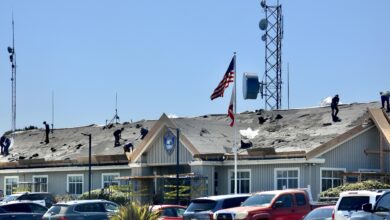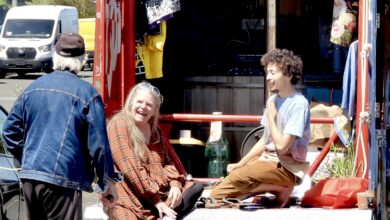Thompson challengers line up to lead 1st Congressional District
(This week: Mitch Clogg and Mike Thompson)
Five candidates in the 1st Congressional District will appear on the June 3, primary ballot, with three to survive to run in the November general election.
Two Republicans, Davis businessman Zane Starkewold and Napa attorney Douglas Pharr, face off for the chance to run against the Democrat from the district.
Since 1999 that Democrat has been Mike Thompson of St. Helena. But this year Thompson faces a primary challenge mounted by fellow Democrat and fellow veteran, Mendocino Coast public interest journalist Mitch Clogg.
Psychiatrist Dr. Carol Wolman of Mendocino faces no competition in her bid for the Green Party nomination.
From the Oregon border to the Napa Valley, the district includes towering redwoods, ocean bluffs and world renown vineyards.
The 11,006-square-mile district spans Del Norte, Humboldt, Lake, Mendocino, Sonoma, Napa and Yolo counties, with a total population of 639,087, according to census figures.
The median income is $38,918 in the district, with 78.6 percent of district residents white, 1.4 percent black, 3.8 percent Asian, 17.8 percent Hispanic, 2.8 percent Native American and 8.6 percent “other” races in census figures. (Totals exceed 100 percent due to an allowance for checking more than one race.)
The district has bounced between Republicans and Democrats throughout its history. Thompson replaced a Republican in 1999. The first congressman elected to the two-year term that remains standard, was Republican Donald C. McRuer in 1865, who didn”t run for reelection and was replaced by a Democrat.
Federal statistics show Sen. John Kerry got 60 percent of the vote in the district in 2004 while President George W. Bush received 38 percent. The district voted for Gov. Arnold Schwarzenegger 51-41 percent in 2006.
The Advocate-News and The Mendocino Beacon posed the same set of questions to all the candidates by email (with slight variations to account for Thompson being the incumbent). Clogg and Thompson”s responses this week will be followed next week by Wolman”s and Pharr”s next week; Starkewold has yet to respond.
Mitch Clogg, 69, Democrat, Mendocino
– Describe your experience that would qualify you for this seat.
Veteran, 101st Airborne Division. Union construction laborer; union equipment operator (“operating engineer”); union dockworker (International Longshoremen); various newspaper unions; staff reporter, Baltimore News-American (Hearst); San Francisco Argonaut (McClatchy); Daily Californian (Berkeley newspaper, then independent); freelance journalist, 1957 to right now; case worker, Mendocino County Dept. of Social Services; commercial salmon fisherman; commercial sea-urchin diver; radio news broadcaster, Fort Bragg; health-facility evaluater (mostly Bay Area nursing homes), California Dept. of Health Services; research writer, California Dept. of Water Resources; founder and principal, Ocean Protection Coalition (halted offshore oil here), journalist-advocate, Housing Now! here ? provided housing for Fort Bragg homeless; single father of three, 18 years; B.A., Rhetoric, UC Berkeley; much, much more.
– Describe any seats you have won/lost the race for:
None
– When did you decide to run? Why?
Fall, 2007. Thompson doing poor job. Local economies dire, fishing and timber industries collapsed, education, health care, infrastructure all in disrepair. Cruel, immoral, illegal and ruinous war continues. He voted against it and voted to continue it ever since. He provided the Blue-Dog-Democrat votes to pass legislation to expand and fund domestic spying and surveillance, then, to keep his constituents appeased, voted against it. He opposes impeachment of Bush and Cheney, the worst administration in American history. He opposes ending the war, universal, single-payer health-care, and social programs (pay-as-you-go, “Paygo” rules are a screen for blocking social-welfare legislation). He writes and passes fewer laws than practically any member of the House, brings home less project funding (earmarks — they”re “pork” in someone else”s district, life”s blood in our own).
His 20 years, 10 in Sacramento, this 10th in Washington, have brought decline to the First District. This is a resource-rich area and should be No. 1 in alternative-energy development — we have a smart, progressive population, high computer literacy and cutting-edge energy companies already in place, unassisted by government funding or grants. We have potentials for wave-, hydro-, solar and wind-energy production and should be leading the world, right here, and ourselves, back to employment and prosperity.
– Who are your key supporters?
Every single voter, of every party, in the First Congressional District, from the Oregon border to the San Francisco Bay.
Issues
– How would you have handled the issue of the Iraq War differently? Afghanistan War?
Neither should have been started. Their failure, in any rational sense of the word, was foregone; their success, as a deep and speedy way to fleece American taxpayers for the enrichment of corporations devoted to privatizing war at immense profit, was guaranteed. If ever the phrase “high crime” is justified, it is in this.
– Rep. Thompson has been a key supporter of the wine industry, including free-trade provisions that the industry demanded. Wine is a key economic interest of the region. What would be your strategy in dealing with the wine issue? How would it be different than Thompson”s?
The elimination of import-export taxes has ruined agriculture for farmers everywhere (our corn exports to Mexico is a tragic case in point). The wine industry in California can compete on the basis of quality and high production without ruining vintners in foreign countries, as in Korea. Mike panders to the wine industry”s campaign donations. He wouldn”t lose many votes by promoting fair and just trade relations, only money, which is decisive to him at all times.
– Same question on the fishing industry.
Time and again the fishing industry has demonstrated its phoenix-like capacity to return from apparent ruin. The money that is needed to assure escapement of juvenile fish to the open sea and return of adult fish to spawning grounds is relatively minor on the scale of state and federal spending, but Mike has not secured it for us, so, for the first time in 140 years, there”s no fishing in California waters. The knowledge is in place. The balance of power tips in favor of agriculture at the expense of fisheries. This is unavoidable, but the use of water for farms must be allocated — and timed — more fairly. This requires more persuasion than loss to the ag sector, more cooperation than sacrifice from anybody.
– Same question on the timber industry.
He”s had 20 years to promote sustained-yield timber harvest regulations. He”s been absent on the question, a miserable failure. Mendocino led the way in the First District, and the state Board of Forestry denied our proposed rules with a dismissive wave of their hands, nullifying years of expert study and negotiation, a triumph of greed and stupidity. He should have fought for them like a junkyard dog.
– What will be your position on ocean sanctuaries?
Mexico to Canada. Designated sport and commercial fishing would continue, under current controls. Personally, I”d like to see bottom trawling, which is deadly destructive to the seafloor, stopped and net fishing higher in the water column redesigned to ensure protection of non-target marine life. No oil, no military research involving ear-splitting undersea detonations.
– Wave energy?
Find out what”s suited for this coast (one of the world”s best for potential wave-energy development) and DO IT! It must be done with the blessings of the coastal population, to give them jobs and juice. It cannot be rammed down their throats (nor will it be). There”s a vast selection in wave-energy development. We don”t have to accept any that doesn”t give us pride and prosperity. It should be done in conjunction with wind, solar and hydro development. The First Congressional District should be FIRST IN THE WORLD in this.
– What will be your key issues beyond those above?
How to avoid the economic homeless shelter we”re entering. An end to war spending instantly and equal expenditure instead on health care, education, alternative energy and job creation. Reinstatement of Section 245(i) of our immigration code, which allows undocumented workers to pay a fine and get a green card. Adoption of the “DREAM Act,” which will enable states to grant in-state tuition to hardworking immigrant students, making higher education (and eventual citizenship) possible.
– Sum up what you would have done differently than Thompson.
I would have represented all of my constituents instead of just the alcohol producers, the finance, real estate, pharmaceutical and for-profit medical and insurance sectors. I would have been an activist in progressive causes and a high-profile promoter of the golden First Congressional District instead of a secretive, low-output Blue Dog (conservative, corporate-friendly, personal enrichment instead of common good) in-name-only Democrat. I would have represented all seven district counties equally, instead of giving the giant share of my attention to the wine business (of which Thompson is a member and vineyard owner, born and raised). As a veteran, I would have opposed this present regime of violence with a ferocity equal to their own, and more. I would have brought together, with my strength and voice and those of other progressives in government, an irresistible assault on our war and warmongering.
– What would you have done the same or similarly?
Very little.
– How much money will you spend on your campaign?
My business (and I don”t know the answer). Everything I have. Less than Mike, who is the third best-financed representative in the 58-member California delegation, behind only Nancy Pelosi and Gerry McNerney.
– What will be the key events of the campaign?
When 200,000 voters have examined my Website www.mitchcloggforcongress.com and they and the media recognize that it”s really no contest.
– What must happen for you to win this race?
People must vote. Non-Democrats must re-register by the May 19 deadline so they can vote for me (and then return to their usual party membership, if they want, for the November election). The June 3 congressional, judicial and supervisorial primary, not normally a sexy election, must be shouted about. I have only to win that to ensure my victory in November. A clear-eyed examination and comparison of me and Mike Thompson will guarantee my success.
– The First District is a geographically vast and politically diverse place. How will you deal with conservative central valley areas that differ vastly from Eureka and Fort Bragg and both differ from the Napa Valley?
Your question goes to campaign strategy. There”s a certain usefulness in seeming to be a sorry chump. There”s a certain usefulness in not being recognized by M.T. as a rival, in seeming so out-gunned the effort appears to be totally hopeless. But I want to assure you and your readers that, with their help, I”ll be their congressman, and with their input — and I mean input from all the parts of this fabulous monster district (which is the longest CD outside of Alaska) — I”ll serve them in the way they want, need and deserve. You”re welcome to quote me, quote all of this, but I won”t discuss strategy unless discussing it will help my campaign. Thanks for asking, though. Darn good question.
Mike Thompson, 57, Democrat, Napa
– Describe why you are the most qualified person for this job, beyond being the incumbent.
My family has been in our district for four generations and I was born and have spent most of my life here. My deep commitment to serving my country began during my combat service in Vietnam.
I have also learned a great deal about the issues facing our district from my own family; my wife, Jan, is a nurse/family nurse practitioner and a previous small business owner in our district, one of my sons is a firefighter, the other is a deputy sheriff in our district, and some of my grandchildren attend public schools in our district. Jan and I own a small family vineyard in our district.
In addition to my personal commitment to our district, I have also held public office for nearly 18 years. I was a state senator for eight years, five years of which I was chair of the Budget Committee and the Joint Legislative Budget Committee. During my tenure in the Senate, I was also chair of the Housing Committee, the Revenue and Tax Committee and the Natural Resources Committee.
– Describe other political seats you have won/lost the race for.
In 1990, I ran for the California State Senate and became the first Vietnam veteran elected to that body. I held that seat until 1998, when I was termed-out and elected to Congress.
– When did you decide to run? Why?
In 1998, just prior to the end of my term, people throughout our district encouraged me to continue serving our area. I received a petition with 5,000 signatures asking me to challenge Republican Congressman Frank Riggs. Based on the public”s support and my strong commitment to our district, I decided to run. When I entered the race, Riggs announced he would not seek re-election to the House of Representatives.
– Who are your key supporters?
Editor”s note: The two-page list submitted includes California Democratic Party, California School Employees Association, North Bay Central Labor Council, Peace Officers Research Association of California (PORAC), Sacramento Central Labor Council, Sacramento Metro Chamber of Commerce, Sierra Club, Assemblymember Patty Berg, State Sen. Pat Wiggins, former State Sen. Wes Chesbro, the sheriffs of Sonoma, Napa, Humboldt, Yolo and Del Norte counties, Fort Bragg City Council members Dan Gjerde, Jere Melo and Dave Turner, and numerous mayors, councilmembers, county supervisors and school superintendents from throughout the district.
Issues
– What is your position on the Iraq War?
I have been against the Iraq War since before it began. I believed it was my duty to see the conditions in Iraq before we sent our service men and women there. After visiting Iraq in 2002, it was clear to me that Iraq posed no threat to our country. I voiced my opposition loudly and cast my vote against authorization of the war.
Since then, I have been one of the most strident voices in Congress for bringing our troops home as safely and quickly as possible. In early 2006, I introduced legislation calling for redeployment of our troops out of Iraq by September 2006.
In early 2007, I introduced legislation with Sen. Barak Obama that set forth a timeline for redeployment and a comprehensive plan for ending the war with Iraq and helping the Iraqi government rebuild and secure their country. Language from this bill was included in a spending bill, which passed the House and Senate, but was ultimately vetoed by the president. In 2007, I introduced a bill calling for immediate redeployment of our troops and implementation of an international diplomatic strategy for containing and quelling the violence in Iraq. In addition, I signed a pledge stating that I will not support any additional funding for the war in Iraq that does not include a concrete deadline for the redeployment of our troops.
Although the war continues and the costs in American lives, Iraqi lives and U.S. taxpayer dollars tragically grows, I maintain my strong opposition to the war and sincerely hope that our new president will work with Congress to bring the war to an end.
– What is your position on the Afghanistan War?
I voted to give the president the authority to invade Afghanistan. However, by diverting our troops and resources to the Iraq War, we have squandered an opportunity to bring peace and freedom to the Afghan people. I believe the only way to make resources available for fighting terrorism and the Taliban in Afghanistan is to bring an end to the war in Iraq.
We must be doing everything we can to ensure we do not bring more violence and instability to the people struggling in Afghanistan. That is why I have been using my position as chairman of the Subcommittee on Terrorism, Human Intelligence, Analysis and Counterintelligence to ensure our intelligence community has the resources they need. I believe strong intelligence is the best way to prevent future wars and help bring peace to the Middle East. I will always make war a last resort.
– Wine is a key economic interest of the region. What would be your strategy in dealing with the wine issue?
My family has been working in the wine industry for three generations, and as a small vineyard owner myself, I am intimately aware of the issues facing the wine community. When I came to Congress, I founded the Congressional Wine Caucus, which remains the largest bipartisan caucus in Congress. Through this caucus, I raise awareness of the industry”s importance and relevant legislation. In particular, we have had success securing funds to combat Pierce”s Disease and the Glassy-winged Sharpshooter, supported efforts to open more states to direct shipments of wine, and worked to strengthen the U.S. system for protecting names of wine origin and preventing deceptive labeling practices.
– Same question on the fishing industry.
Since my time in the State Senate when I carried legislation for salmon habitat restoration projects, I have been a relentless leader in the efforts to protect our North Coast salmon fishing industry.
After the 2002 Klamath River fish kill, I joined and won three law suits against the Bush Administration for poor management of the Klamath River. After the closure of the 2006 season, I pushed the Secretary of Commerce to declare the season a federal fisheries disaster and I secured $60.4 million in economic relief for the fishers, related businesses and tribes. I prompted hearings into Vice President Cheney”s role in the manipulation of science in order to divert water from the Klamath.
As we face another season closure due to historically low stocks in the Sacramento River, I have already urged the Secretary of Commerce to again declare the season a disaster and I am currently working on legislation to bring additional aid to families who will lose their livelihoods. As one of the most important industries in our district, I will always be a dedicated advocate for commercial and recreational salmon fishing industries.
I believe that the health of the salmon population is an indicator of the overall health of our waterways. I previously introduced legislation to begin comprehensive restoration of the Klamath River.
– Same question on the timber industry
Unfortunately, the North Coast”s timber industry has declined over the last two decades for a variety of reasons, from changes in the regulatory environment to the flooding of Canadian softwood into U.S. and most recently, the steep decline in the housing market. I believe in sustainable timber practices that both value the importance of the industry and protect our environment. Since being in Congress, I have supported efforts affecting federal timber lands, such as the Healthy Forest Initiative and the Sustainable Health Forest Restoration Act. As we move to develop policies at the federal level to address climate change, there are opportunities to place greater value on a healthy, sustainable forest industry through emerging carbon sequestration programs.
– Can you explain your position on ocean sanctuaries?
I believe we must do everything we can to protect our nation”s coastline, especially our unique and abundant North Coast. Marine sanctuaries are a good way to protect our coastline from harmful oil and gas development while simultaneously protecting commercial and recreational fishing. I was an original co-sponsor of a bill which extended the Gulf of the Farallones and Cordell Bank marine sanctuaries to Point Arena. Because the bill”s author was hospitalized, I worked with the Natural Resources Committee members to ensure its passage. I have also introduced legislation that would permanently protect the entire North Coast from off-shore oil drilling. A House hearing was held on this bill.
– Wave energy?
I believe our nation must explore all opportunities for reducing our dependency on oil and finding clean energy alternatives. Wave energy is an important option; however, before employing wave energy, we must ensure there are no adverse consequences to the environment, fishing industry or commerce. Before supporting the implementation of wave energy, I must see evidence that it will not harm our precious coastline or local economy. To help reach that goal, I brought together federal agency officials with the city of Fort Bragg to discuss wave energy.
– What will be your key issues beyond those above?
As a senior member of the House Ways & Means” Health Subcommittee, I will continue my efforts to bring better healthcare options to middle-class and low-income Americans, especially in rural areas. I strongly believe significant action needs to be taken on the federal level to conserve our natural resources and protect our planet from global warming. I remain a staunch supporter of fiscally responsible federal spending. I believe we must take action to help American families struggling because of the current economic and housing crisis and we must take steps to protect our nation from similar economic downturns in the future. And as a combat Vietnam veteran, I am dedicated to supporting the needs of our brave men and women in uniform and providing our veterans with quality benefits and care.
– How are you different than the challengers?
I have a proven record of addressing the issues that truly matter to people in our district, from healthcare to the environment to the economy to the war in Iraq. During my time serving our district while traveling almost constantly from the Oregon border, down the coast, across the Napa Valley to West Sacramento and back again, I have met thousands of people who share with me their opportunities and challenges. I”ve valued each of their opinions and my experienced and dedicated staff have helped me do everything I can to improve their lives. I am honored to have tremendous support throughout our district.
– How are you the same?
I respect the commitment we share to public service and our district. I strongly believe that our democracy is only as effective as the people who participate in it. And like nearly everyone I meet in our beautiful district, I am sure they share my love for the hardworking people who reside here and our area”s unique and stunning landscape.
– How much money will you spend on your campaign?
I have been fortunate enough to raise sufficient funds through contributions from more than 5,000 donors from across our district. I will spend only what is needed to run a successful campaign.
– What will be the key events of the campaign?
I have my annual pasta events in each county that are affordable and attract a large number of supporters. For example, we had about 250 people come to the last Fort Bragg event and 250 people come to the Ukiah event. We”ve had 200 people at the Del Norte Co. event, 400 people at the Humboldt Co. event, 600 people at the Napa Co. event, 600 people at the Lake Co. event, 300 people at the Sonoma Co. event and 300 people at the Yolo Co. event.
– You have come under more criticism than has been the custom in past races from within the district. How has this race been different than those you have had in the past from your viewpoint?
I believe the American people are extremely frustrated by consequences of the Bush Administration”s failed policies. And given the Democratic Party”s razor thin majority in the House coupled with an obstructionist President, their frustrations are very understandable. I am equally frustrated that we are still at war in Iraq and that poor choices at the federal level have added to our current economic crisis, not to mention the crisis with our healthcare system and education system.
However, I continue to make substantial progress on many of the issues that directly affect our district, such as healthcare, the environment, agriculture, veterans and fiscal responsibility. I also continue helping thousands of people in our district with everything from Social Security to veteran benefits to transportation projects to passports and visas. From that standpoint, nothing has changed.




